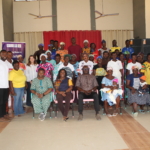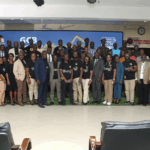
In every democracy, good governance depends on how well the government communicates with its people.
If citizens don’t understand government policies or decisions, it becomes difficult for them to support or participate in national development.
In Ghana, we have a state institution that was created just for this purpose — the National Commission for Civic Education (NCCE). But sadly, this institution is often ignored, while governments prefer using press releases, the Information Secretariat, or even the Office of the President to communicate with the public.
This practice is dangerous. It’s time we asked the hard question: why is the NCCE not being used as the main tool to educate and engage Ghanaians?
The Purpose of the NCCE
The NCCE was set up under Ghana’s 1992 Constitution. Its job is to educate the public on their rights, duties, and the workings of government. It was designed to help every Ghanaian — from the city to the smallest village — understand national issues and be part of the country’s development.
Unlike other platforms that simply share information, the NCCE explains policies in simple language and ensures that Ghanaians understand not just what government is doing, but why it is doing it. That’s a big difference, hence, their support or feedback.
When Communication Becomes a Problem
It is very worrying when a whole Ministry of Communication under the Presidency is said to have misinformed the public. Even if by mistake, such misinformation can create fear, confusion, and public mistrust. If the President’s own communication team gets the facts wrong, how can Ghanaians trust what they hear?
This is not just a minor issue; it can become a national security threat. Inaccurate communication from the highest office can cause panic, harm the country’s reputation internationally, and even spark public unrest.
That’s why communication must be done carefully, truthfully, and with proper checks. And this is where the NCCE must come in.
Lessons from the Past: Mistakes We Shouldn’t Repeat
The previous government also failed to fully use the NCCE. During key times — like when energy problems (dumsor) and economic hardships hit the country, government communication was often done through political spokespeople or press statements. There was no national civic education plan to explain the causes, plans, or solutions in plain language.
This led to confusion, rumours, and rising tension. People felt left out. The government lost the trust of many Ghanaians, and this loss of trust contributed to its eventual defeat at the polls.
What Happens When We Don’t Use the NCCE
When the government ignores the NCCE, it creates bigger problems than it may realise. Here are five key issues that arise:
- Ghanaians remain misinformed or uninformed
Many citizens, especially those in rural areas, don’t fully understand government policies because no one takes time to explain things properly. - Public trust keeps falling
When people feel that government only talks to them during elections or through politicians, they begin to lose trust in the whole system. - Policy misunderstanding leads to resistance
Without civic education, people reject or oppose good policies simply because they don’t understand them. - Increased political tension
When communication is left to party communicators, every message becomes political. This divides the country instead of uniting it. - The NCCE becomes underused and underfunded
A key national asset is left idle, wasting public funds and creating a gap that less credible sources rush to fill.
What the Government Should Do Now
- Make NCCE the official communication arm for civic education
Every major policy or national event should involve the NCCE from the start — not just during emergencies. - Fund the NCCE properly
Increase its budget so it can work more actively across all districts with the tools it needs. - Train and equip NCCE officers with modern communication tools
This includes social media, local language media, town hall platforms, and even school outreach. - Work together across ministries
Ministries should collaborate with the NCCE to plan public education campaigns for every new law or reform. - Build public trust through transparency
Government must commit to open and honest communication, with facts and clear explanations, always using institutions like the NCCE as the channel.
Ghana has what many countries wish they had, a national civic education body that is neutral, experienced, and rooted in the Constitution. Yet, we continue to overlook it and replace it with political messaging and half-baked public relations efforts.
Good communication is not about speaking more. It’s about speaking clearly, truthfully, and through the right channels.
The NCCE is the right channel. The Presidency must never be used as a place to misinform, whether by accident or negligence. We must fix this now, before poor communication damages our democracy beyond repair.
- President Commissions 36.5 Million Dollars Hospital In The Tain District
- You Will Not Go Free For Killing An Hard Working MP – Akufo-Addo To MP’s Killer
- I Will Lead You To Victory – Ato Forson Assures NDC Supporters
Visit Our Social Media for More




